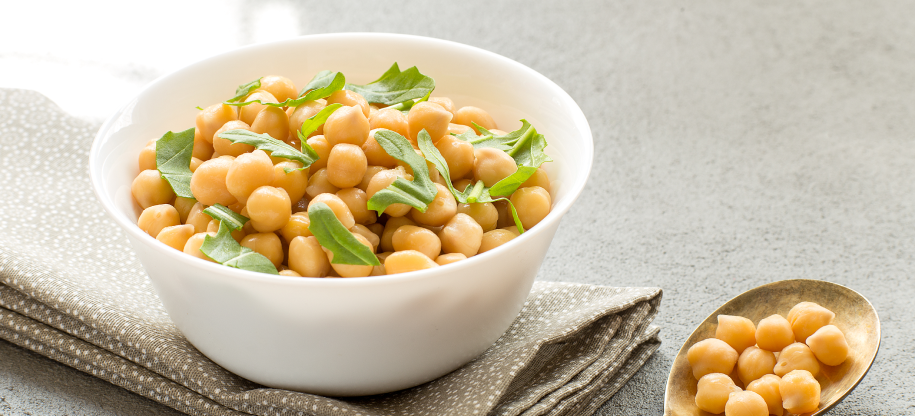
3699
Boiled chana (chickpeas) can offer a variety of health benefits for individuals with Irritable Bowel Syndrome (IBS), though it’s important to approach their consumption thoughtfully and in moderation. Chickpeas are packed with fiber, protein, and essential nutrients that support digestive health, making them a good option for some IBS patients.
However, they can also lead to discomfort for others due to their fiber content and specific carbohydrate composition, so it’s essential to consider individual tolerance and types of IBS (IBS-C, IBS-D, or IBS-M).
Boiled chana supports IBS with fiber for digestion, protein for gut health, and magnesium for relief. It aids gut bacteria, reduces inflammation, and promotes satiety. Let’s learn more about it.
Chickpeas are rich in soluble fiber, which is particularly beneficial for IBS patients, especially those with IBS-C (constipation-predominant). Soluble fiber absorbs water in the gut and forms a gel-like substance that helps soften stool and makes it easier to pass. For people with IBS-D (diarrhea-dominant), soluble fiber can help firm up stools and slow down gut transit time, potentially alleviating symptoms like frequent, loose stools.
Chickpeas are an excellent source of plant-based protein, making them an ideal choice for those following vegetarian or vegan diets. Protein is essential for muscle repair and immune function, and plant-based protein sources like chickpeas can help diversify the diet without triggering IBS symptoms that might arise from animal products. Moreover, protein supports gut health by aiding in the repair and maintenance of the gut lining and promoting a healthy gut microbiome.
Magnesium, found in chickpeas, is a key mineral that helps relax the muscles of the digestive tract, supporting smoother bowel movements. Magnesium-rich foods are beneficial for those with IBS-C, as they can help alleviate constipation and reduce associated symptoms like abdominal cramps and bloating. Additionally, magnesium has a calming effect on the body, which can help with stress, another common trigger for IBS symptoms.
Chickpeas have a low glycemic index (GI), meaning they cause a gradual increase in blood sugar levels. This makes them a good option for people with IBS who experience symptoms like bloating and discomfort after consuming high-sugar or high-carbohydrate foods. Maintaining stable blood sugar levels also supports overall digestive health and can help regulate appetite and prevent overeating.
Chickpeas contain prebiotics, a type of fiber that feeds the beneficial bacteria in the gut. A healthy gut microbiome is vital for managing IBS, as an imbalance in gut bacteria has been linked to IBS symptoms. By supporting gut health, chickpeas may help alleviate some IBS symptoms, particularly in individuals with IBS-D, by improving the balance of gut flora and reducing gut inflammation.
Chickpeas are rich in antioxidants, such as polyphenols, that have anti-inflammatory effects. Chronic low-grade inflammation is thought to contribute to IBS symptoms, and consuming foods that reduce inflammation can offer relief from discomfort and bloating. The anti-inflammatory compounds in chickpeas can help calm the gut and reduce the frequency of flare-ups.
Chickpeas, due to their high fiber and protein content, can help increase feelings of fullness and reduce overall calorie intake. For those with IBS who are also managing weight concerns, incorporating chickpeas in moderation can help control appetite and prevent overeating, which can otherwise exacerbate symptoms like bloating or indigestion.
In addition to supporting digestive health, chickpeas have cardiovascular benefits due to their high content of fiber, protein, and healthy fats. For IBS patients, these heart-healthy nutrients can improve overall well-being. The fiber in chickpeas helps lower cholesterol levels, particularly LDL (bad cholesterol), reducing the risk of heart disease.
For IBS patients managing their weight, chickpeas can be a helpful food choice. Their fiber and protein content contribute to feelings of fullness, which can help control appetite and prevent overeating. Preventing overeating is important as excessive eating can exacerbate IBS symptoms.
A. Boiled chana is good for digestion due to its fiber and prebiotic benefits but may cause bloating in sensitive individuals or those with IBS.
A. It depends on your IBS type and tolerance. If you have IBS-D (diarrhea-dominant IBS), chickpeas may worsen symptoms due to their fiber content. If you have IBS-C (constipation-dominant IBS), small portions may help regulate bowel movements.
Not necessarily. Some IBS sufferers can tolerate small amounts of well-cooked chickpeas, while others may experience symptoms. It’s best to test your tolerance with small servings and adjust based on how your body reacts.
Dr. Pranav Shukla
MBBS, MD Anaesthesia
Disclaimer: This communication does not substitute advice of a medical/healthcare practitioner. Please consult your doctor/healthcare professional for any medical/healthcare advice. Although greatest possible care has been taken in preparation of this response, Dr Reddy's shall not be liable to any person for contents of the same. Images appearing herein are for illustration purposes only.
